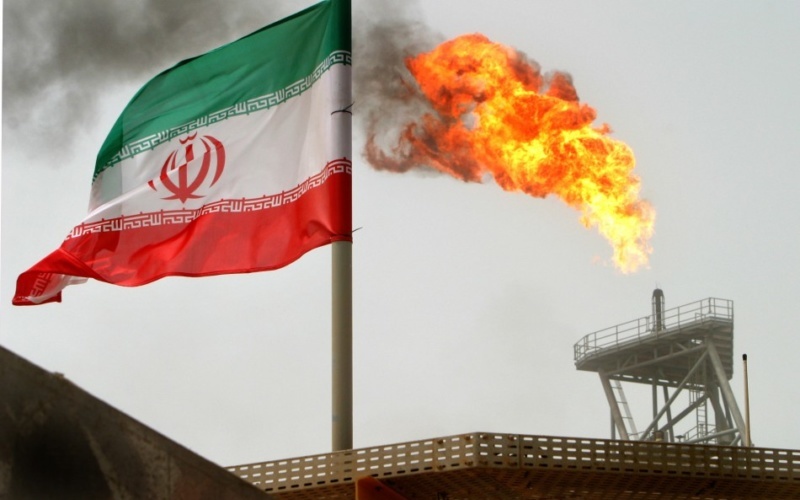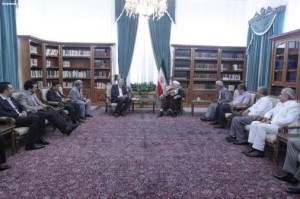LATEST: Central Bank — Prices Up 45%
State outlet Press TV has often distorted news about Iran’s oil exports to cover up growing problems amid US-led sanctions, but on Wednesday it resorted to a flat-out lie:
Recent data shows India’s crude oil imports from Iran have increased by 21.1% in June 2013 compared to a year earlier despite the US-led sanctions imposed on the Islamic Republic’s energy and financial sectors.
Essar Oil Ltd purchased 138,900 barrels per day (bpd) of Iranian crude oil in June, which marks a 16.3% growth compared to the previous month.
The original story from Reuters?
India’s imports of crude oil from Iran more than halved in June from a year ago, as refiner Essar Oil became the only remaining Indian client of the sanctions-hit country, tanker data…showed.
India’s imports for June fell about 60% on an annual basis.
The Reuters story continued — in a passage ignored by Press TV:
Imports from Iran’s top four customers — China, Japan, India and South Korea — of around 860,000 barrels per day (bpd) for the month, down more than a third on the year.
That would be the lowest for Iran’s top four buyers since April, when big drop-offs in barrels shipped into India and Japan cut the total to 635,750 bpd, the smallest in decades.
Iran’s oil exports were about 2.2 million bpd during 2011 and fell to about 1.3 million bpd in 2012.
Reuters explains in its article that “Indian imports from Iran dropped to 140,800 bpd in June, down 45% from May”. Purchases from January to June declined to 211,400 bpd, down more than 42% from the same period in 2012.
Press TV prefers the proclamation, “Major Indian oil refiner, Mangalore Refinery & Petrochemicals Limited (MRPL), is preparing to resume crude imports from the Islamic Republic of Iran after it halted the procedure in April” — a claim which does have some support.
Latest Updates, From Top to Bottom
Hardline Mashregh Examines Hollywood “Preoccupation” With Single-Parent Families
Hardline news outlet Mashregh — whose reporters regularly subject themselves to Hollywood movies solely in order to write in-depth reviews of how they are corrupting Western audiences — has examined a worrying trend in American cinema: the portrayal of single-parent families.
Mashregh’s intrepid journalists watched not one but a whole selection of movies — including The Pursuit Of Happyness; Forrest Gump; Jerry Maguire; and the most corrupt of all, Eighties classic E.T. — and come to the conclusion that Hollywood is having an adverse affect on the cognitive, emotional, social, educational, health, physical and sexual development of Western children.
What is impressive is Mashregh’s extensive knowledge of U.S. celebrity gossip. The hardline outlet notes:
It is interesting to note that Barack Obama’s father left his wife and their son when Barack was three. After separation of her father and mother when was a baby, Angelina Jolie lived with her mother. Tom Cruise, Halle Berry, Samuel L. Jackson, Marilyn Monroe, Jack Nicholson, Jodie Foster, Al Pacino, John Lennon and many other Hollywood stars were in the same situation… The single parent family in America has become a part of society — not just on screen, but it also in real-life.
Gulf Naming Row Spills Over Into Football, Reporting
The ongoing and increasingly bitter dispute between Iran and several Gulf states over the name of the stretch of water extending between the Islamic Republic and the Arabian Peninsula has found new expression this week, in both sport and journalism.
Iran insists the name of this particular extension of the Indian Ocean is the Persian Gulf, whereas Gulf Arab states have dubbed it the Arabian Gulf.
Earlier this week, Iran barred the $2 million transfer of national team Captain Javad Nekounam to a United Arab Emirates club, Sharjah, over an objection to the name of the league in which Sharjah plays — the Arabian Gulf League. (In contrast, Iran has its own Persian Gulf Cup.)
Iran’s Football Federation chief Ali Kafashian told news outlets that the authorities “had to stop” Nekounam from joining the UAE club, but said that President Mahmoud Ahmadinejad would compensate him.
Gulf News quoted a Sharjah official as saying: “We don’t want to be drawn into a political warfare and if it is true, the club management will take necessary action to avoid any confrontations.”
While it would be natural for readers to sympathize with Nekounam and his career, spare a thought for the Iranian outlets who had to report the story. They faced the tough challenge of how to refer to the Gulf States’ name for the channel of water dividing their land from that of Iran.
Mehr News English solved the conundrum in a most creative way. Here’s how Mehr referred to the Iranian name for the water channel between the Iran Plateau and the Arabia Plate:
Iran insists on calling the body of water the “PERSIAN Gulf” and says that historical evidence, including ancient maps, show it has always been “PERSIAN” and part of its territory.
The Islamic republic, whose own football federation has named a “PERSIAN Gulf Cup”, staunchly defends that stance and observes a “National Day of the PERSIAN Gulf” each year on April 30.
Get it? It’s the PERSIAN Gulf.
Now let’s look at how Mehr refers to the Arab state’s name for the same body of water:
The Arab countries of the oil-rich region meanwhile insist on the term “a r a b i a n Gulf” or simply “the Gulf.”
Iranian media said the decision was taken to stop the veteran international from playing in the UAE’s newly-renamed “a r a b i a n Gulf League,” a rebranding which has stirred tensions.
Rafsanjani: We Must Not Overlook People’s Will In The Election
Former President Hashemi Rafsanjani on Thursday said that the Islamic Republic should not overlook the people’s will as expressed in the June Presidential election.
Speaking at a meeting with Iranian sportsmen, Rafsanjani said that the Islamic Republic was not a “directorial” system and that it must not throttle its youth.
Central Bank: Prices Up 45%
The Central Bank has reported that the annual inflation rate in June-July was 45.1%.
That is a sharp rise on the previous rate of 36%, which in turn is more than double the level reported last year.
The Bank said prices had increased 200% between 2009-2012.


